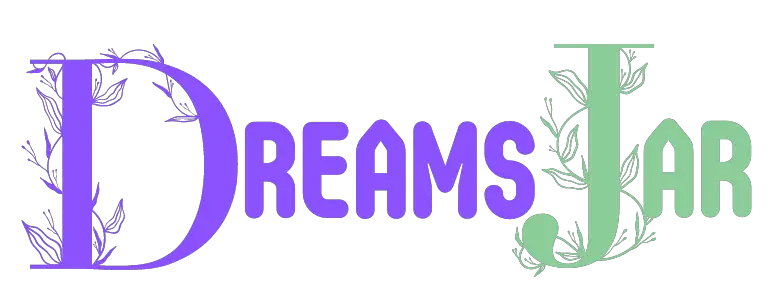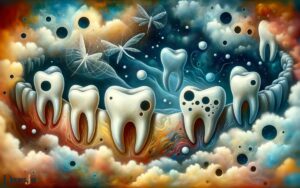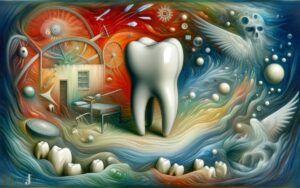Broken False Teeth Dream Meaning? Fear of Embarrassment!
Dreaming about broken false teeth generally symbolizes concerns about appearance, fear of embarrassment, or anxiety about communication and self-expression. These dreams may suggest a fear of rejection or worry about how others perceive you.
The interpretation of dreams featuring broken false teeth can vary, but here are some common psychological and emotional themes associated with such dreams:
For example, a person who is about to give a public speech may dream about their false teeth breaking as a manifestation of their anxiety about public speaking.
Dreams of broken false teeth often reflect deep-seated insecurities and the fear of social judgment.

Key Takeaway
Interpreting Broken False Teeth Dreams: Symbolic Meanings
| Symbolic Theme | Possible Interpretation |
|---|---|
| Self-image | Concerns about personal appearance and public perception |
| Communication | Anxiety about expressing oneself or speaking in public |
| Vulnerability | Fear of being judged or feeling embarrassed |
| Change | Navigating through life transitions or personal transformations |
| Health | Worries about personal or loved one’s health issues |
Common Interpretations
Among the common interpretations of dreaming about broken false teeth is a potential indication of feelings of vulnerability or powerlessness.
Dreams often serve as a mirror to our subconscious, reflecting underlying emotions and concerns.
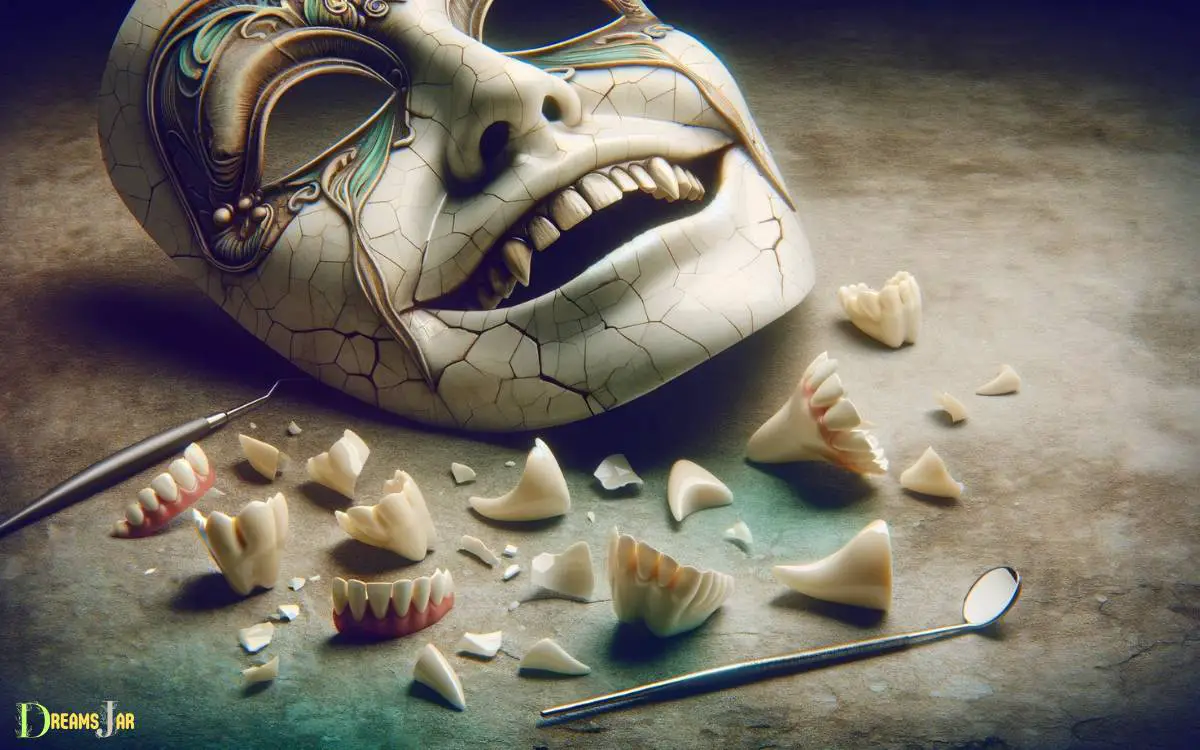
In this context, broken false teeth could symbolize a sense of insecurity or a fear of losing control in waking life.
The dream may be a manifestation of anxieties related to one’s appearance, speech, or ability to communicate effectively. It can also signify a fear of being unable to maintain a façade or uphold a certain image.
Understanding these common interpretations can provide valuable insights into the dreamer’s emotional state and inner struggles, shedding light on areas that may require attention or resolution.
Psychological Symbolism
Dreaming about broken false teeth can carry psychological symbolism that relates to feelings of vulnerability and powerlessness, potentially reflecting underlying emotions and concerns in the dreamer’s subconscious.

The following psychological insights may provide a deeper understanding of the symbolism behind this dream:
- Insecurity: The dream may signify a sense of insecurity or lack of confidence in the dreamer’s waking life.
- Loss of Control: It could represent a fear of losing control or feeling powerless in a particular situation.
- Communication Issues: Broken false teeth in dreams may also symbolize difficulties in expressing oneself or fear of being misunderstood.
- Self-image Concerns: The dream might be linked to concerns about appearance, aging, or the fear of being judged by others based on physical attributes.
Emotional Significance
The emotional significance of dreaming about broken false teeth often reflects deeper symbolic meanings. Symbolic dental trauma in dreams may represent feelings of insecurity or vulnerability in waking life.
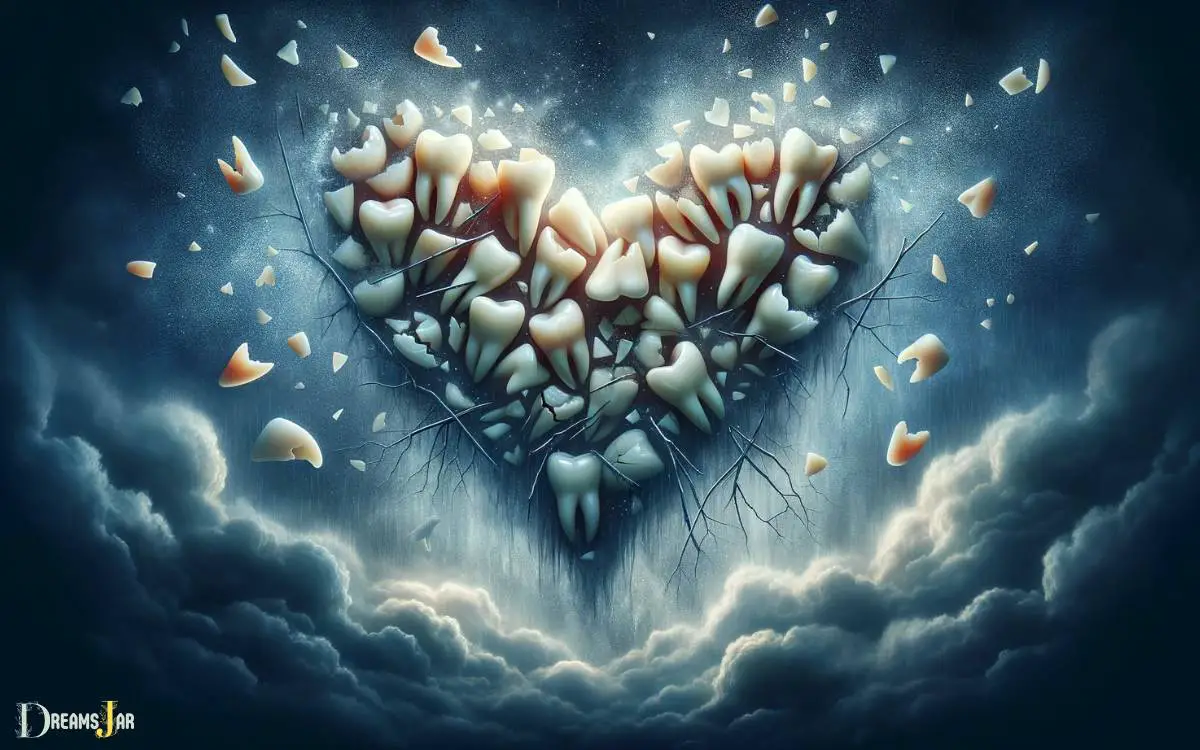
Additionally, the fear of losing control or experiencing a loss of power may also be associated with this dream imagery.
Symbolic Dental Trauma
Symbolic dental trauma carries significant emotional significance and can serve as a powerful symbol of psychological distress. This type of trauma often represents deeper emotional issues and can be indicative of various underlying concerns.
Here are some insights into the symbolic significance of dental trauma:
- Loss of control and power
- Fear of vulnerability
- Communication difficulties
- Self-esteem and self-image issues
Understanding the symbolic meaning of dental trauma can provide valuable insights into one’s emotional state and psychological well-being. It is essential to recognize the profound impact that such symbolism can have on an individual’s mental and emotional health.
These insights can help individuals address and work through the underlying emotional distress associated with dental trauma, ultimately leading to healing and personal growth.
Fear of Vulnerability
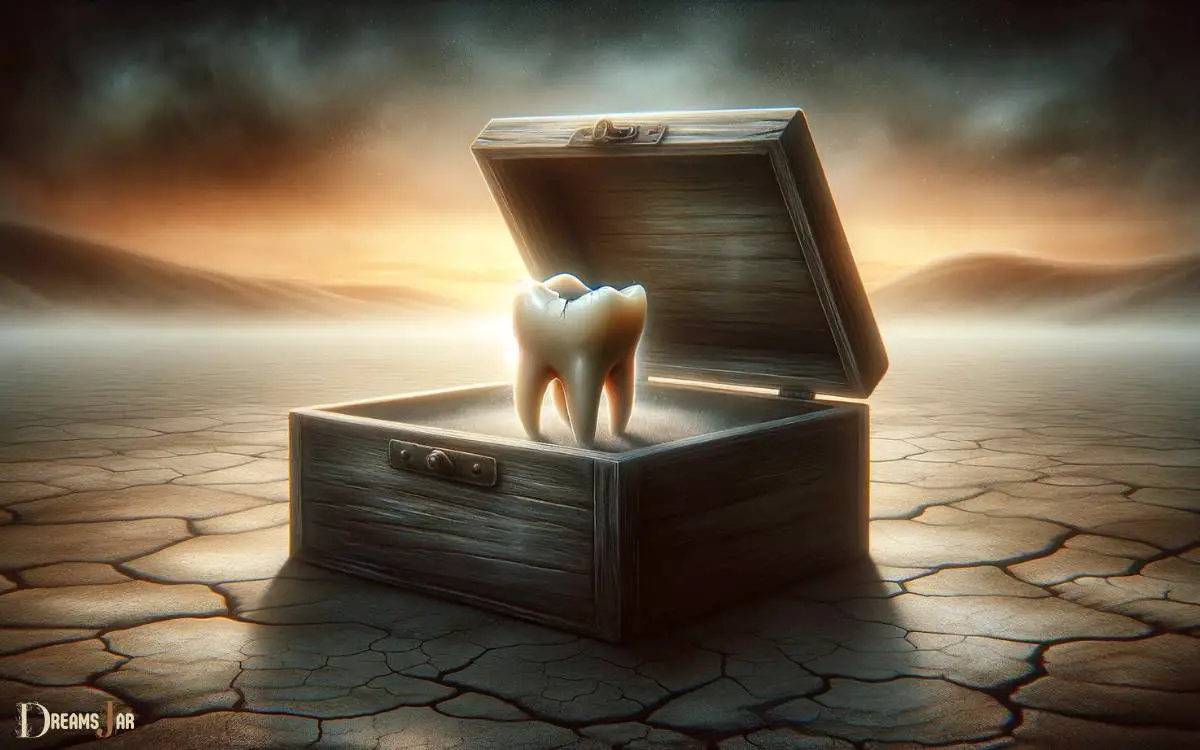
An individual’s fear of vulnerability holds deep emotional significance and can profoundly impact their psychological well-being. Fear of vulnerability stems from a deep-seated concern about being emotionally exposed or getting hurt.
This fear often arises from past experiences of emotional pain or rejection, leading individuals to erect emotional barriers as a form of self-protection.
The fear of vulnerability can manifest in various aspects of one’s life, including relationships, work, and personal development. Understanding the emotional significance of this fear is crucial in addressing and overcoming it.
By recognizing and acknowledging these emotions, individuals can begin to work through their fears and develop healthier coping mechanisms.
The following table illustrates common signs and effects of the fear of vulnerability:
| Signs of Fear of Vulnerability | Effects of Fear of Vulnerability |
|---|---|
| Avoiding intimacy and emotional openness | Difficulty forming deep connections |
| Fear of rejection and abandonment | Anxiety and insecurity in relationships |
| Hesitancy to express true emotions | Feelings of loneliness and isolation |
| Perfectionism as a defense mechanism | Fear of failure and criticism |
| Difficulty seeking help or support | Sense of being overwhelmed and unsupported |
Loss of Control
A common emotional response associated with the loss of control is a profound sense of disorientation and vulnerability.
When individuals experience a loss of control, it can trigger a range of emotional reactions, including:
- Anxiety and fear: The uncertainty of not being in control can lead to heightened anxiety and fear, causing individuals to feel on edge and unsettled.
- Frustration and helplessness: The inability to influence or manage a situation can evoke feelings of frustration and helplessness, leading to a sense of powerlessness.
- Anger and resentment: Some individuals may respond to loss of control with anger and resentment, directed towards themselves or others involved.
- Emotional exhaustion: The emotional toll of feeling out of control can result in emotional exhaustion, leaving individuals feeling drained and overwhelmed.
This emotional turmoil can significantly impact one’s overall well-being and mental health, highlighting the importance of understanding and addressing the implications of loss of control.
The loss of control can have a profound impact on an individual’s self-esteem, shaping their perception of themselves and their abilities.
Impact on Self-esteem
The impact of broken false teeth on self-esteem can be significant. It affects one’s psychological well-being, social interactions, and confidence. Individuals may experience feelings of embarrassment or insecurity.

This can lead to a reluctance to engage in social activities or speak openly. As a result, it has a profound effect on their overall sense of self-worth and comfort in various social situations.
Psychological Effects on Self-Esteem
Psychological effects on self-esteem due to broken false teeth can be significant and impactful, influencing an individual’s self-perception and confidence.
The impact on self-esteem can manifest in various ways, such as:
- Social Withdrawal: Individuals may feel self-conscious about their appearance and withdraw from social interactions, leading to feelings of isolation.
- Negative Self-Image: The presence of broken false teeth can lead to negative self-image and feelings of inadequacy, affecting overall self-worth.
- Communication Challenges: Difficulty speaking clearly due to broken false teeth can lead to frustration and embarrassment, impacting one’s confidence in communication.
- Anxiety and Depression: The psychological distress of broken false teeth can contribute to feelings of anxiety and depression, further affecting self-esteem.
Understanding these psychological effects is crucial in providing support and empathy to individuals experiencing such challenges.
Social Interactions and Confidence
Social interactions and confidence are profoundly influenced by the presence of broken false teeth, often resulting in significant impacts on an individual’s self-esteem.
The visible absence or damage of teeth can lead to feelings of self-consciousness, affecting the way individuals engage in social situations.
Confidence in one’s appearance plays a pivotal role in social interactions, and the presence of broken false teeth can lead to a reluctance to smile, speak, or engage in activities that draw attention to the mouth.
This can hinder the development of meaningful connections and erode self-esteem. Individuals may experience a heightened sense of vulnerability, fear of judgment, and social withdrawal due to these insecurities.
Understanding the profound impact of broken false teeth on social interactions is crucial for offering support and empathy to those affected by such challenges.
Reflection of Communication Issues
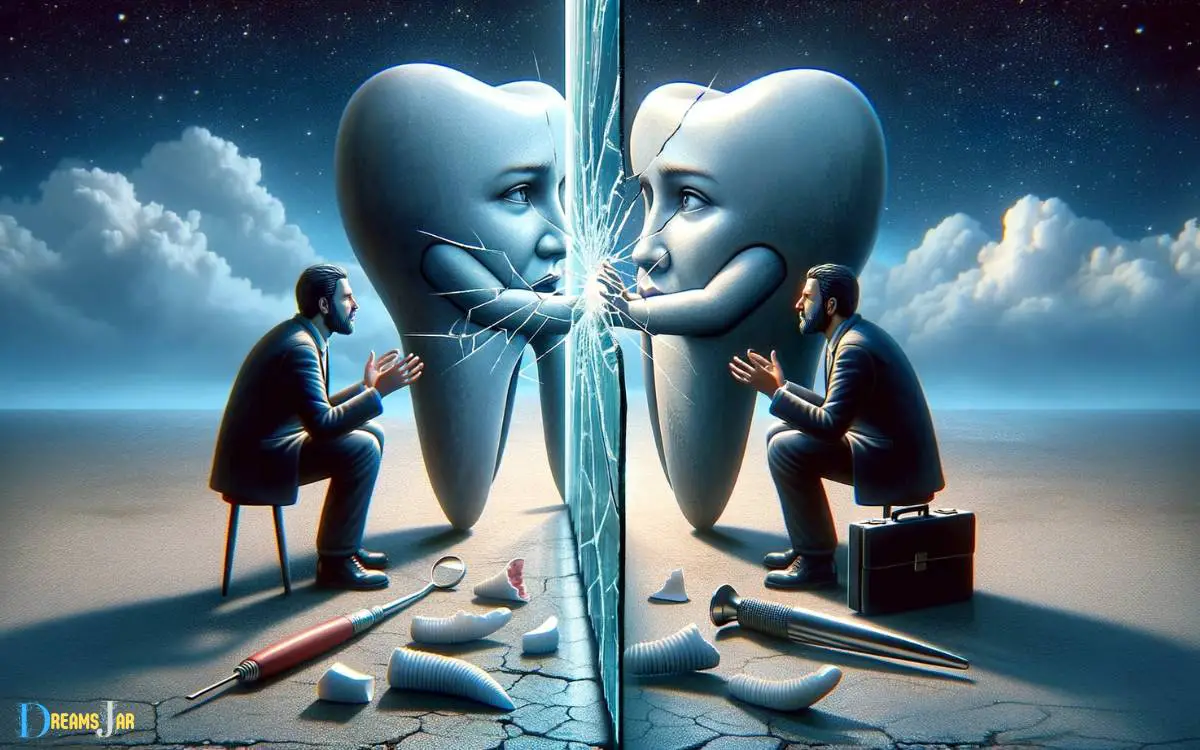
Manifestation of communication issues often appears as a reflection in dreams. When individuals experience difficulties in expressing themselves, their subconscious mind may materialize these struggles in the form of broken false teeth in dreams.
This symbolic representation can provide valuable insights into the underlying communication challenges individuals may be facing in their waking lives.
The broken false teeth dream may serve as a mirror to reflect various communication issues, such as:
- Fear of speaking up
- Feelings of inadequacy in conveying thoughts
- Struggles in articulating emotions
- Sensitivity to criticism or judgment
Understanding the reflection of communication issues in dreams can offer a starting point for individuals to address and overcome these challenges, ultimately leading to improved communication skills and enhanced interpersonal relationships.
Coping Strategies
One effective approach for addressing the communication challenges reflected in the broken false teeth dream is to develop targeted coping strategies that empower individuals to navigate and overcome these obstacles in their daily interactions.

Coping strategies may include assertiveness training to help individuals express their needs and concerns effectively, improving non-verbal communication skills such as body language and facial expressions, and seeking support from trusted individuals or professionals.
Additionally, practicing active listening and empathy can aid in building stronger connections with others despite the perceived barriers.
It’s important to recognize that overcoming communication challenges requires patience and perseverance, and individuals may benefit from self-care practices to manage any feelings of frustration or inadequacy.
Conclusion
The dream of broken false teeth often represents feelings of insecurity, vulnerability, and communication challenges. It reflects the dreamer’s emotional state and self-esteem, and may signify unresolved issues in interpersonal relationships.
Understanding the psychological symbolism and emotional significance of this dream can help individuals develop effective coping strategies and improve their communication skills to address underlying concerns.
Dream analysis can provide valuable insights into the subconscious mind and aid in personal growth and self-awareness.
